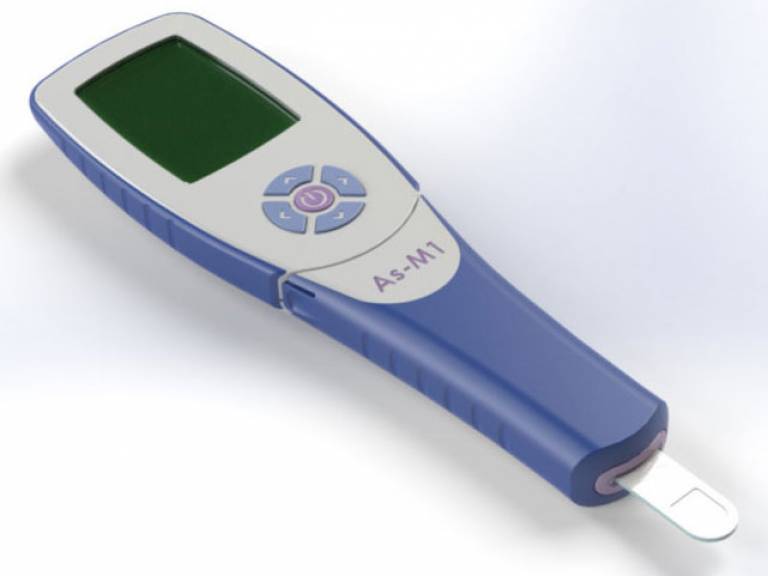Simple arsenic sensor could save lives
7 March 2018
A low-cost, easy-to-use arsenic sensor to test drinking water has been developed by researchers at UCL and Imperial College London, with BBSRC funding through the government's Industrial Strategy.

140 million people worldwide drink water containing unsafe levels of arsenic, according to the World Health Organisation. In one region of Bangladesh, one of the worst-affected countries, around 20% of all deaths are attributable to arsenic poisoning.
Through Industrial Strategy funding, UCL and Imperial College have developed a small, sensitive and accurate sensor which produces an immediate measure of the arsenic level in water, at a cost of less than $1 per test. This makes it suitable for testing multiple sites in rural areas in low and middle income countries, where the problem of arsenic poisoning from contaminated drinking water is greatest, and potentially saving lives.
Dr Joanne Santini, Reader in Microbiology at UCL Structural & Molecular Biology, had the idea of developing a sensor to detect arsenic in water when she discovered a microscopic organism that eats arsenic.
Follow-on funding and a CASE studentship from BBSRC allowed Dr Santini and Professor Tony Cass, Professor of Chemical Biology at Imperial College London, whose work led to development of the first electronic blood glucose monitor, to begin work on an arsenic sensor.
Developing commercial ideas and supporting spin outs is crucial to the Government's Industrial Strategy and Bio Nano Consulting, a spin-out from UCL and Imperial College London, has patented the sensor design and, using a Smart Award from Innovate UK, created a prototype which it can produce in batches of up to 100.
Commenting on this game-changing product, Universities and Science Minister Sam Gyimah said: "This sensor to detect harmful levels of water contamination will make a huge difference across developing nations, potentially saving millions of lives. Too many people are exposed to dangerous levels of arsenic and this product is a clear demonstration of our Industrial Strategy in action, creating the technology of tomorrow and supporting the high-value, high skilled jobs that will make Britain fit for the future."
Dr David Sarphie, CEO of Bio Nano Consulting, said: "Arsenic contamination of water is a hugely important issue, and the technology hasn't existed to enable it to be addressed properly. We feel that a user-friendly, cheap and rapid test could be extremely beneficial in terms of revolutionising how the problem might be addressed."
This new sensor resembles the blood glucose meters used by diabetics. Once a drop of water hits the test strip, which is inserted into the sensor, it produces a digital reading of the arsenic level in one minute. This would allow it to be used by local people in rural areas in low and middle income countries, where the problem of arsenic poisoning is greatest and access to healthcare and technology is limited.
Currently available tests for arsenic need to either be carried out by scientists in a laboratory or using chemical test kits that produce toxic chemicals, and take up to half an hour to give a result.
Dr David Sarphie, continued: "We were doing some early-stage field trials a few months ago in Bangladesh and a lot of the villagers were actually pleading with us to come and measure their well, because they had no idea how much arsenic was in their water."
Karen Lewis, Executive Director, Innovation at BBSRC said: "BBSRC has supported researchers in their quest to develop a low-cost, easy-to-use device that can quickly test drinking water and help prevent arsenic poisoning from contaminated drinking water. It is exciting that spin-out company Bio Nano Consulting is now performing field trials and researchers expect it to be on the market within three years".
The researchers expect it to be on the market within three years.
Links
- The full case study about the simple arsenic sensor
- Dr Joanne Santini's academic profile
- UCL Structural & Molecular Biology
Source
Media contact
Bex Caygill
Tel: +44 (0)20 3108 3846
Email: r.caygill [at] ucl.ac.uk
 Close
Close

